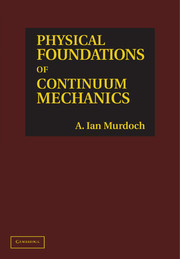Book contents
- Frontmatter
- Contents
- Preface
- 1 Introduction
- 2 Some Elements of Continuum Mechanics
- 3 Motivation for Seeking a Molecular Scale-Dependent Perspective on Continuum Modelling
- 4 Spatial Localisation, Mass Conservation, and Boundaries
- 5 Motions, Material Points, and Linear Momentum Balance
- 6 Balance of Energy
- 7 Fine-Scale Considerations: Moments, Couple Stress, Inhomogeneity, and Energetics
- 8 Time Averaging and Systems with Changing Material Content
- 9 Elements of Mixture Theory
- 10 Fluid Flow through Porous Media
- 11 Linkage of Microscopic and Macroscopic Descriptions of Material Behaviour via Cellular Averaging
- 12 Modelling the Behaviour of Specific Materials: Constitutive Relations and Objectivity
- 13 Comments on Non-Local Balance Relations
- 14 Elements of Classical Statistical Mechanics
- 15 Summary and Suggestions for Further Study
- Appendix A Vectors, Vector Spaces, and Linear Algebra
- Appendix B Calculus in Euclidean Point Space ℰ
- References
- Index
8 - Time Averaging and Systems with Changing Material Content
Published online by Cambridge University Press: 05 November 2012
- Frontmatter
- Contents
- Preface
- 1 Introduction
- 2 Some Elements of Continuum Mechanics
- 3 Motivation for Seeking a Molecular Scale-Dependent Perspective on Continuum Modelling
- 4 Spatial Localisation, Mass Conservation, and Boundaries
- 5 Motions, Material Points, and Linear Momentum Balance
- 6 Balance of Energy
- 7 Fine-Scale Considerations: Moments, Couple Stress, Inhomogeneity, and Energetics
- 8 Time Averaging and Systems with Changing Material Content
- 9 Elements of Mixture Theory
- 10 Fluid Flow through Porous Media
- 11 Linkage of Microscopic and Macroscopic Descriptions of Material Behaviour via Cellular Averaging
- 12 Modelling the Behaviour of Specific Materials: Constitutive Relations and Objectivity
- 13 Comments on Non-Local Balance Relations
- 14 Elements of Classical Statistical Mechanics
- 15 Summary and Suggestions for Further Study
- Appendix A Vectors, Vector Spaces, and Linear Algebra
- Appendix B Calculus in Euclidean Point Space ℰ
- References
- Index
Summary
Preamble
Time averaging is shown here to pervade the microscopic foundations of macroscopic modelling, whether in appreciating the nature of intermolecular forces in terms of subatomic dynamics (recall Section 5.4), establishing links between continuum field values and actual measurements (recall Section 3.10), deriving balance relations for systems with changing material content, or exploring the conceptual foundations of statistical mechanics.
After recalling the notion of a Δ-time average introduced in Section 5.4, such averaging is applied directly to the continuity equation and balances of linearmomentum and energy established in Chapters 4, 5, and 6. Field values in the resulting relations are thereby identified as local averages of molecular quantities computed jointly in both space and time. Such relations apply to material systems which do not change with time. Any system M+ whose material content does change with time is regarded to be a subset of an unchanging material system M. Relations for M+ are established by introducing a membership function ei for each element Pi of M: ei(t) = 1 (or 0) according to whether Pi ∊ M+ (or Pi ∉ M+) at time t. An equation which prescribes the time evolution of a single global representative velocity for M+ is derived utilising time averaging: this serves to establish the methodology to be used later in deriving local balances of mass, linear momentum, and energy, and also to discuss the fundamentals of rocket and jet propulsion.
- Type
- Chapter
- Information
- Physical Foundations of Continuum Mechanics , pp. 130 - 166Publisher: Cambridge University PressPrint publication year: 2012



